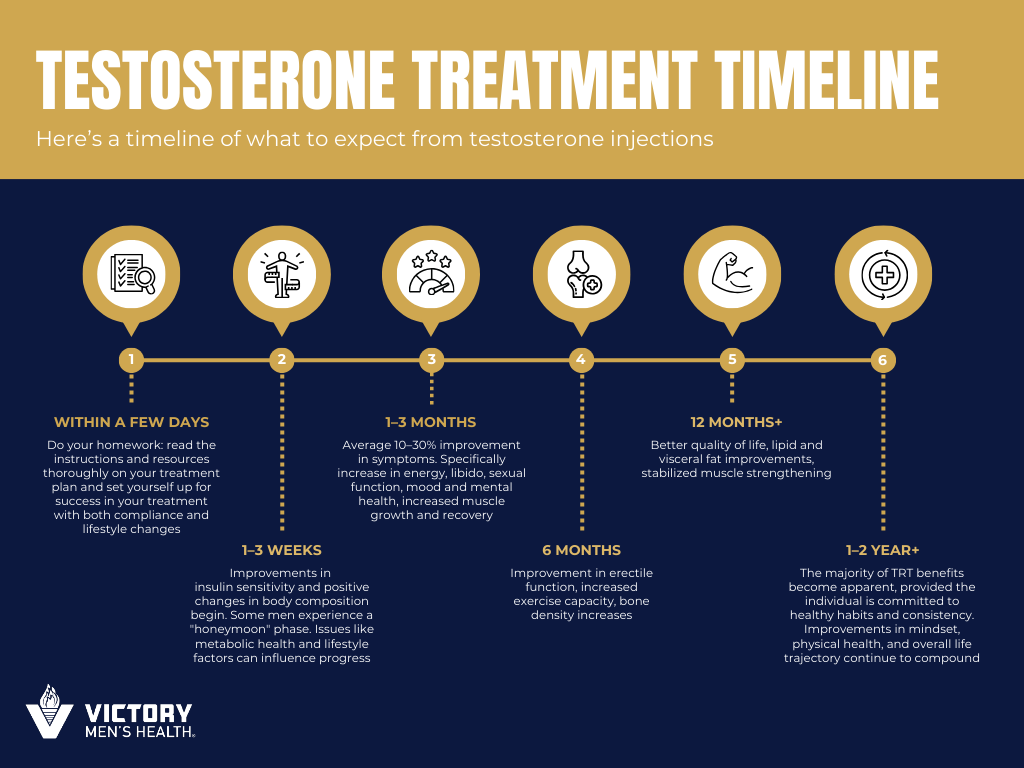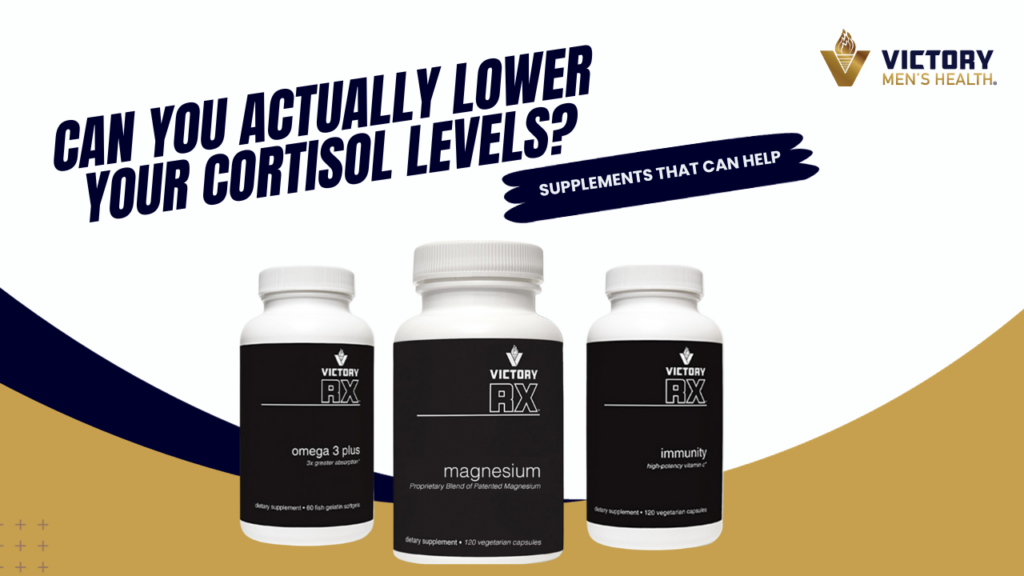When you finally have a solution to symptoms you’ve been struggling with for years, it’s normal to wonder how long it will take to see results. Today, we’re diving into a common question for men considering Testosterone Replacement Therapy (TRT): How long does it take for TRT to work? Understanding the TRT timeline can help set realistic expectations for your journey to feeling like your best self.
So… How Long Does It Take TRT To Work?
Starting testosterone therapy is a big step—and a smart one if your levels are low. Most guys want to know when they’ll feel the difference. While every man’s journey is a little different, many start noticing positive changes within the first 6 to 12 weeks. Energy, mood, drive, and even your workouts can start to feel better during this window.
But here’s the deal: TRT isn’t a magic fix on its own. What you eat, how you move, and how well your treatment is managed all play a role. If your nutrition is off and you’re not staying active, those benefits might be slower to show up—or not as strong. The best results happen when testosterone therapy is combined with a solid lifestyle, regular lab work, and a team that knows how to dial in your dosing for real impact.

TRT Results Timeframe: The Benefits of TRT & When to Expect Them
Low testosterone levels can lead to a range of symptoms, including decreased energy, reduced sex drive, depression, and difficulties in maintaining muscle mass. TRT is a very effective treatment designed to boost these hormone levels and help you get back that “zest” for life.
Increased Energy
One of the first changes many men notice is a boost in energy. Fatigue tends to fade, and that sluggish, worn-down feeling starts to lift. This TRT benefit usually kicks in within 2 to 4 weeks, with energy continuing to improve over the first couple of months—especially when paired with better sleep and nutrition.
Improved Mood
Low testosterone is often linked to brain fog, irritability, and even symptoms of depression. As TRT starts to balance your hormones, you may notice a sharper mind and more emotional stability. These changes often begin around 3 to 6 weeks, with continued improvement over several months.
Enhanced Libido
For many men, a reduced sex drive or erectile issues are what lead them to seek TRT in the first place. Sex drive and morning erections often improve within the first 3 to 4 weeks, with noticeable changes in overall sexual performance and satisfaction by 6 weeks or beyond, depending on individual factors.
When it comes to ED, there are several factors at play that could be impacting your performance. If ED is a concern for you, TRT can help with your testosterone levels, but we also recommend creating a tailored plan based on your specific hormone levels. Check out our blog post on the ED treatment options we offer to learn more.
Increased Muscle Mass
TRT won’t do the work for you, but it helps your body make better use of the workouts you’re already doing. With consistent training, men often see noticeable improvements in their muscle tone and strength starting around 6 to 12 weeks, with continued gains over time. Proper protein intake and strength training will help maximize this benefit, so make sure your lifestyle habits align with your health and fitness goals.
Improved Confidence
As the physical and mental benefits of testosterone therapy start stacking up, so does confidence. Many men say they simply feel more like themselves again; others say they feel better than ever. This overall sense of well-being often becomes noticeable within 4 to 8 weeks, and it continues to build as other symptoms improve.
Better Insulin Sensitivity
If you’re dealing with stubborn belly fat, blood sugar issues, or prediabetes, low testosterone might be part of the problem. TRT can help improve insulin sensitivity by helping your body use insulin more efficiently, which supports better blood sugar control and a leaner physique.
These metabolic improvements usually take a little longer to show up, often becoming noticeable around 3 to 6 months into treatment. When combined with clean eating and regular workouts, TRT can be a powerful tool for men looking to take control of their long-term metabolic health.
How Long Do TRT Results Last?
Testosterone replacement therapy isn’t a quick fix—it’s a long-term commitment to feeling your best. Once your levels are optimized and your dose is dialed in, the benefits of TRT can last for as long as you stay consistent with your treatment. That means ongoing therapy, regular check-ins with your healthcare provider, and sticking with healthy habits like proper nutrition, exercise, and adequate sleep.
If you stop taking TRT, your testosterone levels will likely drop back down over time, and symptoms can return. But with the right plan and a trusted medical team, many men enjoy lasting energy, strength, and mental clarity for years to come thanks to testosterone therapy.
What is the Typical Timeline for TRT Benefits?

The response to testosterone injections varies for each person, but here’s a general TRT timeline for the changes you can expect to see:
- Libido: Improvements in sexual interest and satisfaction typically start within 3-4 weeks, plateauing at about 6 weeks.
- Mood: Noticeable changes in mood and depressive symptoms can be expected after 3-6 weeks, with maximum benefits after 18-30 weeks.
- Insulin Sensitivity: Small improvements may be seen within a few days, though effects on glycemic control take 3-6 months.
- Body Composition: Changes in fat mass, lean body mass, and muscle strength start within 6-12 weeks, stabilizing at 6-12 months.
Remember: Most individuals start to notice significant changes from TRT within 4 to 6 weeks, but this timeline can differ based on individual health factors and lifestyle choices.
Testosterone Injection Timeline
Here’s a timeline of what to expect from testosterone injections.
- Within a few days: Improved insulin sensitivity.
- 3 weeks after treatment begins: Enhanced sex drive, mood improvements, and better quality of life.
- 4 weeks after starting: Improved lipid profile and sexual performance.
- 3 months (12 weeks) from the start: Better glycemic control, increased exercise capacity, and noticeable changes in body composition.
- 6 months into treatment: Increased bone density and possible changes in PSA levels.
- 12-month benefits: Peak effects on red blood cell formation, stabilized muscle strengthening, improved mood, and overall health.
How Does TRT Progress Over the First Year?
The first few months of testosterone therapy are where most men start feeling the shift. In the first 6 to 12 weeks, you’ll likely notice more energy, better sleep, sharper focus, and a boost in mood and motivation. Libido and sexual performance often start improving during this phase, too. It’s common to feel more like yourself again—more drive, more mental clarity, more stamina.
This is also when we’re closely monitoring your labs and symptoms to fine-tune your dose so you’re getting the full benefits of TRT without overshooting. From month three through the rest of the year, the deeper, long-term benefits start to kick in. You may notice steady gains in muscle mass and strength, better recovery from workouts, a drop in body fat, and improved metabolic health.
Confidence builds as your body composition changes, energy remains steady, and those early wins become consistent. With the right support team, regular check-ins, and a solid foundation of good habits, TRT can deliver life-changing results—and by the end of year one, you’ll likely be operating at a level you haven’t felt in years. How does that sound?
Begin Your TRT Journey With Victory Men’s Health
At Victory Men’s Health, we understand that every man is unique. That’s why we emphasize personalized care. Testosterone injections provide the most control over your dosage, allowing us to monitor and adjust your treatment based on your specific needs.
If you’re ready to address symptoms of low testosterone, our team is here to help. We offer comprehensive hormone panels to determine your specific needs and tailor a treatment plan that’s right for you. Serving clients in Missouri and Illinois via telehealth, as well as through our four clinic locations, we’re committed to helping you feel like the best version of yourself.
Testosterone Replacement Therapy is a journey, not a race. At Victory Men’s Health, we’re dedicated to guiding you through this journey, ensuring you achieve the best possible results for a healthier, happier life. Ready to start? Contact us today to schedule a consultation and take the first step towards balancing your hormones and reclaiming your vitality.
